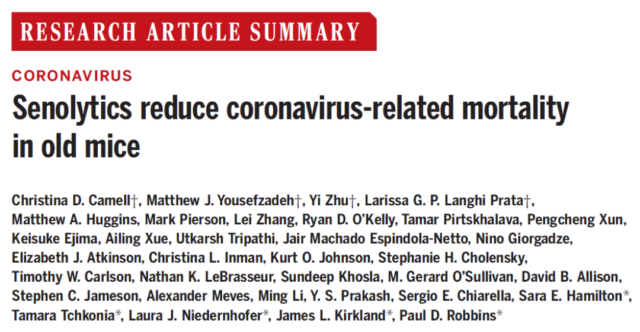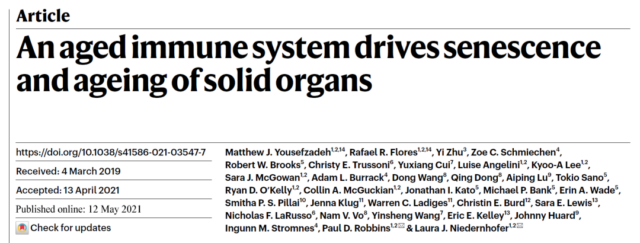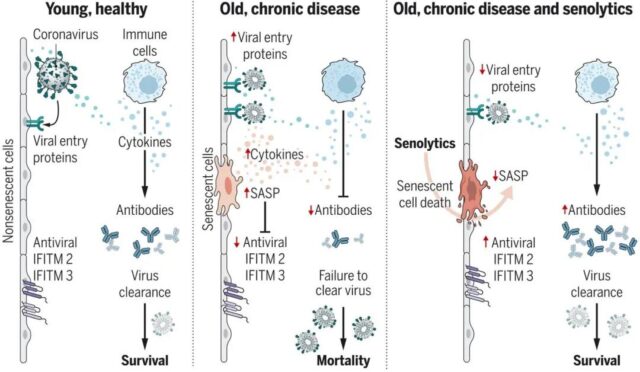Senolytics can reduce the mortality rate of elderly individuals infected with pathogens
- Normal Liver Cells Found to Promote Cancer Metastasis to the Liver
- Nearly 80% Complete Remission: Breakthrough in ADC Anti-Tumor Treatment
- Vaccination Against Common Diseases May Prevent Dementia!
- New Alzheimer’s Disease (AD) Diagnosis and Staging Criteria
- Breakthrough in Alzheimer’s Disease: New Nasal Spray Halts Cognitive Decline by Targeting Toxic Protein
- Can the Tap Water at the Paris Olympics be Drunk Directly?
Anti-aging drug Senolytics can reduce the mortality rate of elderly individuals infected with pathogens
Anti-aging drug Senolytics can reduce the mortality rate of elderly individuals infected with pathogens. Aging is a natural process. With age, all people will gradually age, which seems to be an unchangeable natural law.
However, in recent years, with the acceleration of global aging, countries around the world have set off a wave of anti-aging research, and various anti-aging drugs and therapies have been discovered one after another, such as nicotinamide, metformin and Senolytics therapy.
Senescent cells will continue to exist and continue to secrete many pro-inflammatory and tissue remodeling molecules to poison other surrounding cells. Not only that, scientists have found through transcriptome analysis that, like cancer cells, senescent cells increase the expression of the “pro-survival network” to help them resist apoptosis or programmed cell death.
In 2015, Dr. James Kirkland of the Mayo Clinic in the United States and others published a paper [1] in the journal Aging Cell, reporting a combination of drugs that selectively kill senescent cells-Senolytics. Senolytics therapy consisting of dasatinib and quercetin can selectively induce the death of senescent cells.
Among them, dasatinib can eliminate aging human adipocyte progenitor cells, while quercetin can kill aging human endothelial cells and mouse bone marrow stem cells. The combination of the two has a stronger effect.
From this point of view, senescent cells are the key driving factor of the body’s aging, and the elimination of senescent cells can delay or alleviate many age-related diseases.
The research also makes Senolytics a new star anti-aging drug. The research team established Unity Biotechnology company around the drug to promote clinical trials. The company has been listed on the Nasdaq and has a current market value of approximately US$200 million. The company’s investors also include the world’s richest man, Amazon founder Bezos.

On July 16, 2021, the research team from the University of Minnesota and the Mayo Medical Center in the United States published a research paper titled: Senolytics reduce coronavirus-related mortality in old mice [2] in the Science journal.
The study shows that the anti-aging drug Senolytics can reduce the death rate associated with the coronavirus in elderly mice.

The elderly and patients with chronic diseases face greater risks and higher mortality after being infected with COVID-19. Senescent cells secrete pro-inflammatory factors, also known as senescence-associated secretory phenotype (SASP). Senescent cells will continue to accumulate with age and cause chronic inflammation, thereby increasing the adverse consequences of infection.
On May 12, 2021, researchers from the University of Minnesota and the Mayo Clinic in the United States published a research paper titled: An aged immune system drives senescence and ageing of solid organs in the top international academic journal Nature [3].
The study shows that aging immune cells are the most dangerous type of aging cells, which will accelerate the aging of other organs, thereby promoting systemic aging. Therefore, aging immune cells have also become a key therapeutic target for prolonging healthy lifespan.
The study found the best target cells for the anti-aging drug Senolytics, which will help the research team further develop Senolytics targeting senescent immune cells.

In this Science study, the research team found that using lipopolysaccharide (LPS) or neocorona S protein to simulate pathogen infection, senescent cells and senescence-related secretory phenotypes (SASP) in multiple organs of old mice increased significantly.
Then, the research team used the mouse hepatitis virus (MHV) closely related to the SARS-CoV-2 virus to infect elderly mice. The senescent cells and senescence-associated secretory phenotype (SASP) of these elderly mice increased significantly, and the mortality rate reached 100. %.
Then, the research team used the anti-aging drug Senolytics to treat these elderly mice, their senescent cells were reduced, and the mortality rate was reduced to 50%.

This indicates that Senolytics can reduce deaths caused by pathogen infection by reducing senescent cells and related phenotypes. It also shows that senescent cells are an important cause of poor results after pathogen infection in elderly individuals.
References:
1. https://onlinelibrary.wiley.com/doi/full/10.1111/acel.12344
2. https://science.sciencemag.org//373/6552/eabe4832
3. https://www.nature.com/articles/s41586-021-03547-7
(source:internet, reference only)
Disclaimer of medicaltrend.org
Important Note: The information provided is for informational purposes only and should not be considered as medical advice.



